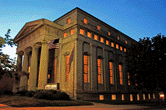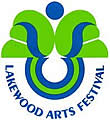 |
The Lakewood Masonic Temple |
| 15300 Detroit Avenue · Lakewood, Ohio | |
| A Lakewood Landmark Since 1916 |
CONTENTS
Contact Us
The Lakewood
Masonic Temple
Find Us
Virtual Tour
Building Tours
Community Use
Hall Rentals
Calendar
Photo Gallery
History
Temple Company
The Lakewood
Masonic Foundation
About Us
Donate
Grants Made
Newsletters
The Lakewood
Masonic Family
Lakewood F&AM
Clifton-Allen F&AM
Cunningham RAM
Lakewood R&SM
Holy Grail KT
Ann Rutledge OES
Cleveland Beauceant
Lakewood DeMolay
Links
(The following account from the graphic pen of the first Historian of Lakewood Lodge, Henry J. Weidenthal, Past Master, was excerpted by E. George Lindstrom as a prelude to 25th anniversary of the 1915 laying of the cornerstone of the present Lakewood Masonic Temple.)
The genesis of Lakewood Lodge is found in the meetings held by a little group of Masons then living in the growing village of Lakewood. That was in the year 1907. These Masons were members of lodges in Cleveland and elsewhere who had vision enough to realize that the time could not be far distant when a Masonic lodge would be a necessity in the suburban city.
At these meetings, ways and means were discussed and a partial census of the Masonic population of Lakewood was taken. In the fall of 1907 a petition for a dispensation was drafted and this was signed by 116 Master Masons. The request was granted and thus the actual Masonic history of Lakewood was begun.
This recitation of the mere facts seems to make the formation of Lakewood Lodge a simple process. But we of today would find it difficult to understand the amount of labor that was put into Lakewood Masonry up to the time that the dispensation was granted.
Let us go back a matter of thirty years and picture Lakewood as it then was. A few thousand men and women constituted its population. There was not a single hall fit to house a Masonic institution. At the corner of Detroit avenue (it was Detroit street in those pioneer days) and Warren road there stood a two-story brick block erected on the site of the toll house that had been torn down but a few years before. This block originally designed as a dance hall had been made over into office suites, and here seemed to be the only possible location for a new lodge. Negotiations for a lease of the second floor of this building were successfully concluded and Brother L. W. Thomas, a competent architect, agreed to furnish plans for the remodeling. All this was necessary even before a dispensation could be granted, for no Grand Master would grant such a dispensation unless he were assured that the prospective lodge had an adequate and safe place of meeting.
Several thousand dollars were needed. We can hardly realize the amount of work it took to raise the money and proceed with the making of lodge quarters. It was only the enthusiasm of the little group of Masonic pioneers that finally brought success.
The first regular meeting under dispensation was held in the lodge room at Detroit avenue and Warren road on March 24, 1908.
At this point a sketchy description of the first meeting place of Lakewood Lodge may not be uninteresting to the several hundred brothers who never were inside its doors. The anteroom was small and plainly furnished. The lodge room was almost square with a low ceiling that made ventilation practically impossible during the hot weather. The decorations were in blue and a green figured carpet was on the floor. A younger brother seeking information on the subject of why a Blue Lodge should install a green carpet was told the sad truth--that the green carpet was a remnant that could be bought cheap and anyway it "looked kind of blue" under artificial light.
The heating was by natural gas stoves placed in the northwest corner and alongside the desks of the treasurer and secretary. The corners were popular places for the brethren on cold nights. The platform which constituted the East was built entirely across the room and on it in addition to the Master's chair were the desks of the secretary and treasurer as well as a reed organ that was the joy of every member.
Because of the necessity to cut expenses, the switches for the lights were placed in the tyler's room and the brothers will certainly recollect with what anxiety the late Brother J. E. Tegardine, the tyler, used to peep through the little hole cut in the door so he could see just when to turn the lights up or down.
The floors of the old lodge room were not soundproof and there was always some anxiety during certain degrees because we felt that the good housewife buying her pound of porterhouse from the butcher downstairs might figure there was a riot going on upstairs and call the town marshal.
But in spite of the physical handicaps those who met there will testify that those were happy and profitable days.
See also:
History of the Lakewood Masonic Temple




